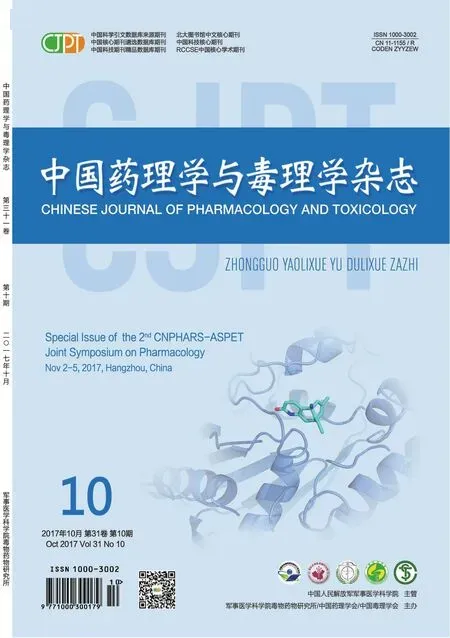Discovery of a small molecule targeting ULK1-modulated cell death of triple negative breast cancer in vitro and in vivo
2017-01-16LeileiFUYuqianZHAOBoLIU
Lei-lei FU,Yu-qian ZHAO,Bo LIU
(State Key Laboratory of Biotherapy and Cancer Center,West China Hospital,Sichuan University,and Collaborative Innovation Center of Biotherapy,Chengdu 610041,China)
T1-11
Discovery of a small molecule targeting ULK1-modulated cell death of triple negative breast cancer in vitro and in vivo
Lei-lei FU,Yu-qian ZHAO,Bo LIU
(State Key Laboratory of Biotherapy and Cancer Center,West China Hospital,Sichuan University,and Collaborative Innovation Center of Biotherapy,Chengdu 610041,China)
OBJECTIVETo discover a small molecule targeting ULK1-modulated cell death of triple negative breast cancer and exploreits potential mechanisms.METHODSULK1 expression was analyzed by The Cancer Genome Atlas(TCGA)analysis and tissue microarray(TMA)analysis.ULK1 agonist was designed by using in silico screening,as well as modified by chemical synthesis and screened by kinase and anti-proliferative activities.The amino acid residues that key to the activation site of LYN-1604 were determined by site-directed mutagenesis,as well as in vitro kinase assay and ADP-Glo kinase assay.The mechanisms of LYN-1604 induced cell death were investigated by fluores⁃cence microscope,western blotting,flow cytometry analysis,immunocytochemistry,as well as siRNA and GFP-mRFP-LC3 plasmid transfections.Potential ULK1 interactors were discovered by performing comparative microarray analysis and the therapeutic effect of LYN-1604 was assessed by xenograft breast cancer mouse model.RESULTSWe found that ULK1 was remarkably downregulated in breast cancer tissue samples,especially in triple negative breast cancer(TNBC).32 candidate small molecules were synthesized,and we discovered a small molecule named LYN-1604 as the best candidate ULK1 agonist.Additionally,we identified that three amino acid residues(LYS50,LEU53 and TYR89)were key to the activation site of LYN-1604 and ULK1.Subsequently,we demonstrated that LYN-1604 could induce autophagy-associated cell death via ULK complex(ULK1-mATG13-FIP200-ATG101)in MDAMB-231 cells.We also found that LYN-1604 induced cell death involved in ATF3,RAD21 and caspase 3,accompanied with autophagy and apoptosis.Moreover,we demonstrated that LYN-1604 had a good therapeutic potential on TNBC by targeting ULK1-modulated cell death in vivo.CONCLUSIONWe discovered a small molecule(LYN-1604)has therapeutic potential by targeting ULK1-modulated cell death associated with autophagy and apoptosis of TNBC in vitro and in vivo,which could be utilized as a new anti-TNBC drug candidate.
UNC-51-like kinase 1(ULK1);cell death;autophagy;ULK1 agonist;triple negative breast cancer(TNBC)
The project supported by National Natural Science Foundation of China(81402496,81673455 and 81602627);China Postdoctoral Special Science Foundation(2017T100704);and China Postdoctoral Science Foundation(2015M580794)
Bo LIU,Tel:15708469925,E-mail:liubo2400@163.com
杂志排行
中国药理学与毒理学杂志的其它文章
- Identification and optimization of a potent and highly selective D3 dopamine receptor agonist
- Protective role of FoxO transcription factors against oxidative stress-induced chondrocyte dysfunction:a new therapeutic target for osteoarthritis
- Meta-analysis of serum copper and heart failure
- Involvement of cysteinyl leukotriene signaling in microglial morphological changes and CASP1 expression in vitro
- Inhibitory effect of compound NS5806 on cardiac transient outward potassium channel dependents on interaction between auxiliary subunits
- Connexin 40-formed GJIC increases the phototoxicity of photodynamic therapy through ROS-and calcium-mediated pathways
